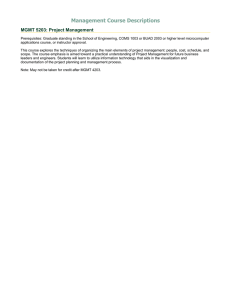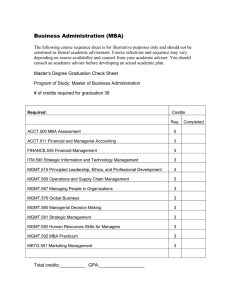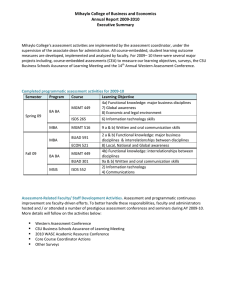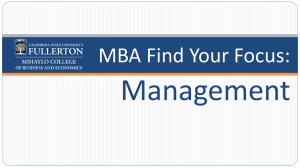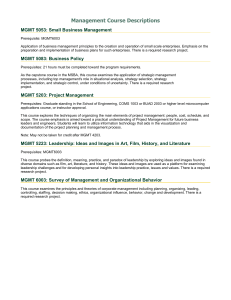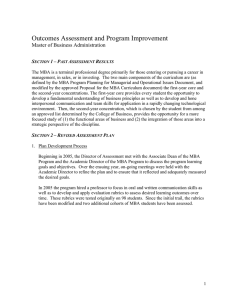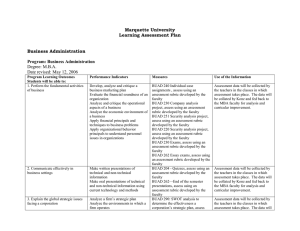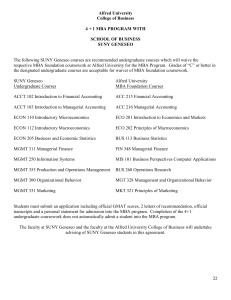College of Business and Economics Assessment Committee 2004 – 2005 Report
advertisement
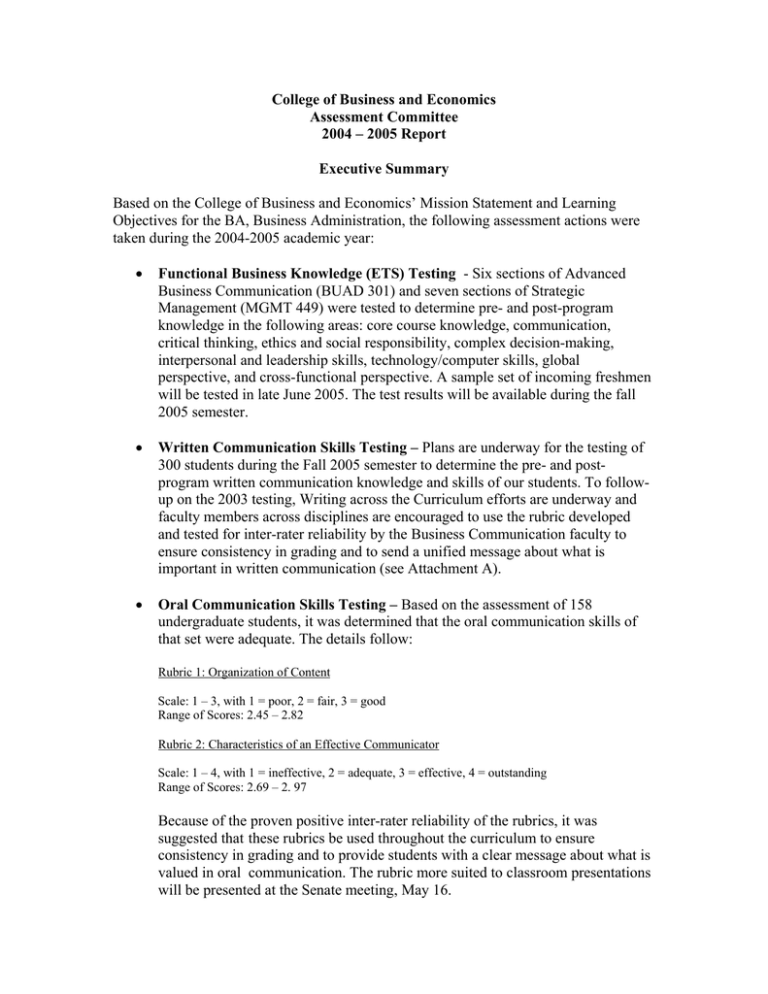
College of Business and Economics Assessment Committee 2004 – 2005 Report Executive Summary Based on the College of Business and Economics’ Mission Statement and Learning Objectives for the BA, Business Administration, the following assessment actions were taken during the 2004-2005 academic year: • Functional Business Knowledge (ETS) Testing - Six sections of Advanced Business Communication (BUAD 301) and seven sections of Strategic Management (MGMT 449) were tested to determine pre- and post-program knowledge in the following areas: core course knowledge, communication, critical thinking, ethics and social responsibility, complex decision-making, interpersonal and leadership skills, technology/computer skills, global perspective, and cross-functional perspective. A sample set of incoming freshmen will be tested in late June 2005. The test results will be available during the fall 2005 semester. • Written Communication Skills Testing – Plans are underway for the testing of 300 students during the Fall 2005 semester to determine the pre- and postprogram written communication knowledge and skills of our students. To followup on the 2003 testing, Writing across the Curriculum efforts are underway and faculty members across disciplines are encouraged to use the rubric developed and tested for inter-rater reliability by the Business Communication faculty to ensure consistency in grading and to send a unified message about what is important in written communication (see Attachment A). • Oral Communication Skills Testing – Based on the assessment of 158 undergraduate students, it was determined that the oral communication skills of that set were adequate. The details follow: Rubric 1: Organization of Content Scale: 1 – 3, with 1 = poor, 2 = fair, 3 = good Range of Scores: 2.45 – 2.82 Rubric 2: Characteristics of an Effective Communicator Scale: 1 – 4, with 1 = ineffective, 2 = adequate, 3 = effective, 4 = outstanding Range of Scores: 2.69 – 2. 97 Because of the proven positive inter-rater reliability of the rubrics, it was suggested that these rubrics be used throughout the curriculum to ensure consistency in grading and to provide students with a clear message about what is valued in oral communication. The rubric more suited to classroom presentations will be presented at the Senate meeting, May 16. • 2004 Graduating Senior Survey – Out of 1,700 surveys sent, 366 graduates responded, for a 22 percent response rate. Overall student satisfaction with the education received was 3. 64 (out of 5); this figure is down from 3. 73 in 2003. In response to the survey results, specific action was taken in Placement Services, Faculty/Student Interaction, Business World Interaction Opportunities, and Business Ethics Awareness. • 2004 College Advising Center Survey – Using electronic technology, all College of Business and Economics students were surveyed (over 6,500). Of this number, 550 messages were undeliverable; however 594 students responded for a 10 percent response rate. On a scale from 1 – 5 (1 = very dissatisfied to 5 = very satisfied), the range of responses was lowest (3.45) for Waiting Period and highest (4.06) for Listening Skills. Although the Waiting Period number was low, it has improved significantly from 2002’s figure of 2.85. Significant changes were made in advisor-student interactions and waiting room improvements to help improve student satisfaction in that area. Along with BA, Business Administration program activities, assessment activities were also focused on the MBA and BA, International Business. Details include: • MBA Assessment Plan - As part of the overall MBA update, an assessment plan was developed and approved by the committee for implementation in the 2005-06 academic year. • BA, International Business Assessment – Although International Business students take the same gateway assessment classes (BUAD 201 / 301) as general business students, their capstone course is different (MGMT 480 – Global Strategic Management versus MGMT 449 – Strategic Management). Therefore, to obtain post-test assessment information on International Business students, the ETS will be administered in two sections of MGMT 480 starting fall 2005 and International Students at the senior level will be invited to participate in the written communication skills and knowledge assessment. For the next academic year the committee will focus on the following: - 3, 5, and 10 year MBA Alumni Survey Written Communication Skills and Knowledge Assessment Technology Skills and Knowledge Assessment ETS for Sample of MGMT 480 Students MBA Assessment Activities Committee Members: For the 2004-05 academic year, committee membership included: Linda Fraser, Katrin Harich, Chaitra Keshav (graduate student assistant), Laura Marcoulides, Tom Mayes, Robert Miller, Denise Stanley, Teeanna Rizkallah, Blaine Walgren, Tom Johnson, and Joni Norby.
